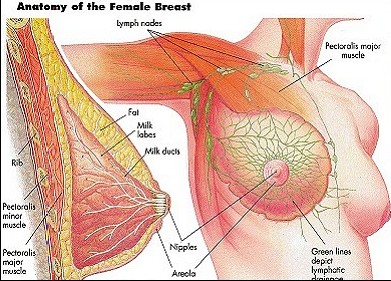

 |
What are your choices?
The natural approach is to look at breast discomfort from a number of ways at the same time. Breast tenderness is not really a medical illness, so why treat it medically with strong drugs, given all the risks involved? The natural approach involves giving your body the tools it needs to heal itself, using good food, supplements and herbs to correct any imbalances with female hormones. What you eat and drink can make an enormous difference to the breast problems you experience during your cycle. I have seen some women eliminate all symptoms in just one cycle by making a few changes.
Supplements
The supplements recommended below have been studied in clinical trials and have been found to be effective in connection with breast problems. For best results you should take them over a period of three months, at the end of which you should be reassessed in order to monitor improvements and changes and then adjust the supplement programme according to your new condition.
Multivitamin and Mineral
A good quality multi-vitamin and mineral would form the foundation of your supplement programme to make sure that you are getting a little bit of everything. You then add in those nutrients in slightly higher amounts which are known to be helpful for breast problems.
Vitamin E
Vitamin E has been shown to help reduce breast pain and tenderness in a number of studies and is worth supplementing over a couple of months to see if it helps ease your symptoms. Vitamin E is found in foods such as almonds, leafy green vegetables, oats, soya, sunflower seeds and oil, wheatgerm and whole grains, but you should also take a good supplement.
B Vitamins
If there is a deficiency of the B vitamins in your body, your liver will be unable to inactivate 'old' oestrogens which can be playing havoc with your cycle and creating an excess of oestrogen because 'old' hormones are not being eliminated properly. Taking a B-complex tablet can help to reduce breast symptoms for this reason.
Lactobacillus acidophilus
Cyclical breast changes may be due to an excess of oestrogen over progesterone. Lactobacillus acidophilus helps to increase the levels of enzymes that work to reabsorb the 'old' oestrogens in your body. These probiotics (beneficial bacteria) also help to improve the transit time of a bowel movement. The longer waste material stays in your system the more 'old' hormones and toxins can be reabsorbed back into your body.
Essential Fatty Acids (EFAs)
Essential fatty acids are not only an important part of a healthy diet, but they can make a big difference to problems associated with hormones. Aim to get plenty in your daily diet (in the form of nuts, seeds, oily fish, walnuts and oils such as corn and safflower). Apart from this, however, its a good idea to take a daily supplement. Research has shown that supplementing with evening primrose oil which contains GLA (gamma linolenic acid) can have a significantly positive effect on breast discomfort. The GLA helps to control the production of a 'bad' prostaglandin called PGE2, which can causes heat and inflammation in the breasts if levels are too high. GLA also increases the level of another 'good' prostaglandin PGE1, which can help to balance the effect of prolactin on the breasts.
The GLA content is normally 40mg per capsule and you may need to take up to 8 capsules a day to achieve the desired effect (the suggested dosage is between 240 and 320 mg per day). The GLA content in each capsule varies tremendously between supplement producers, so its worth scouting around for a brand with higher levels of GLA. Evening primrose oil is only one of the important oils studied for its effect on breast discomfort. Other oils, such as linseed oil, starflower oil, blackcurrant seed oil and borage oil may be just as effective.
Warning
Check with your doctor before taking any capsules containing GLA if you have a history of epilepsy.
Will I be more susceptible to breast cancer if I have breast problems during my cycle?
First and foremost, its important to establish that being prone to breast problems throughout your cycle does not mean that you are at a higher risk of developing breast cancer. What breast pain, tenderness and lumps do tell you, however, is that your hormones are not functioning correctly. By achieving optimum health, through diet, and by addressing any vitamin and mineral deficiencies, your body will be given the opportunity and the tools it needs to correct any imbalances you may be suffering. The key word in natural medicine is prevention. Its a great deal easier to prevent a problem than it is to try to correct once it has appeared. Furthermore, by adopting a healthier lifestyle you will be more likely to prevent breast cancer.
Herbs
The aim of the herbal remedies is to help balance your hormones and to ensure that your liver processes oestrogen efficiently so that any excess is excreted properly. The herbs also help support the changes you are making with your diet in order to speed up the process.
Agnus Castus
(Vitex/Chastetree berry) This herb can be enormously useful in the treatment of breast tenderness because of its ability to balance the female hormones.
(See Wild Yam & ChasteTree)
Ginkgo Biloba
A trial conducted by a hospital in France has shown that women who took ginkgo had significantly less pre-menstrual breast pain than those who took a placebo. Ginkgo helps to increase circulation and can also reduce swelling.
Herbs for the liver
The liver, which is the major organ of detoxification, helps to eliminate accumulated 'old' oestrogen so it is important that it is functioning efficiently. Both milk thistle and dandelion are excellent herbs for optimising liver function. If your body does not excrete oestrogen then you can end up with an accumulation which then further upsets the balance of oestrogen to progesterone
.
|